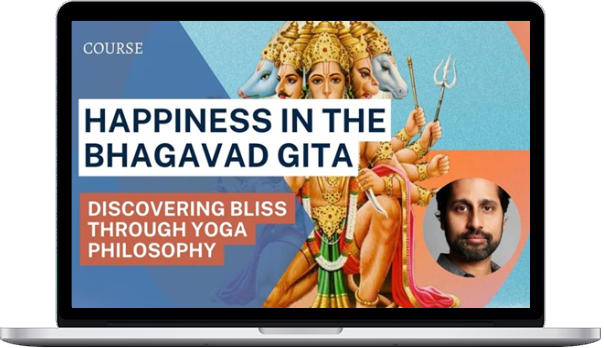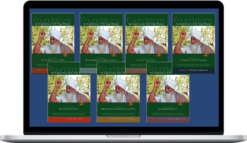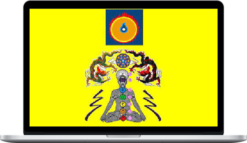Neil Dalal – Happiness in the Bhagavad Gita – Collection
$149.00 $33.00
»Delivery: Within 24hs
Description
Neil Dalal – Happiness in the Bhagavad Gita – Collection
How can I be a happy person? How do I live a happy life? We all seek happiness and well-being; yet remaining happy is an elusive goal. This course approaches these questions through the teachings of the Bhagavadgītā.
In the Bhagavadgītā, Kṛṣṇa conveys a unique yogic psychology and related yogic methods designed to release emotional contractions such as suffering, anger, and anxiety. Furthermore, he unfolds a contemplative self-inquiry that reveals our deepest sense of self as innately whole and untouched by fear and suffering. Within this recognition is absolute freedom, an absolute wholeness that transcends happiness conceived as transient affective mental states of joy or well-being.
Kṛṣṇa’s teachings are not only a radical revisioning of our self-identity and our interrelated connection to the world, but a revisioning of our conceptualizations (and potential misconceptions) about happiness. This course will include close readings of key Bhagavadgītā verses as well as reflexive contemplative practices to experientially engage teachings as personal insights.
What You’ll Learn In Happiness in the Bhagavad Gita
Module 1: Understanding Happiness: The Bhagavadgītā’s Worldview
- This module overviews the Bhagavadgītā’s approach to happiness. Understanding happiness requires insights into unhappy afflicted states.
- The text provides an elegant psychological model of how pathologies of attachment (e.g. desires and aversions) transform into afflicted states such as anger and sorrow.
- This process contains an unconscious projection of our happiness onto external objects, relationships, and results.
- Understanding this projection and the limitations of transient happy states opens our minds to a deeper pursuit of wholeness and freedom.
- This module will also differentiate the Gita’s goal of wholeness from goals found in contemporary ideologies of health, wellness, and spirituality.
Module 2: Cultivating Happiness in Action: Interconnection, Īśvara, and Equanimity
- How can we be free within action and in relating to the world and other beings? How can we develop an equanimous mind? This module explores the Bhagavadgītā’s teachings on a yoga of action (karma-yoga).
- Karma-yoga is not merely selfless service; but rather a deep understanding of our interconnected relationship with the world, which is a divine expression of īśvara (“God” for lack of an accurate English term).
- Karma-yoga reframes our way of being in the world as a ritual life of offering; a life in which we learn to accept the results of action as ritual products.
- This yogic process removes our projections of happiness, which in turn frees us from manipulating the world to provide happiness, frees us from desperately clinging to particular outcomes, and resolves the psychological contractions of afflictive states. We are then more capable of engaging the world (and our minds) with resilience, compassion, care, and altruism.
Module 3: Discovering Happiness: The Innate Fullness of One’s Being
- This module focuses on the deepest view of the Bhagavadgītā regarding the intrinsic nature of one’s self (ātmā).
- The Bhagavadgītā directs us to understand the ground of our subjective being, which is always present but as though hiding within all experiences.
- This ground is consciousness itself, and distinct from any cognition or mental state. Its intrinsic nature is nondual wholeness. Thus, our self is the single self of īśvara and all beings in reality. As pure consciousness, this self is untouched, free of fear and sorrow, and not subject to loss. The yogic path of knowledge (jñāna-yoga) culminates in recognizing one’s self as the whole.
- This recognition is the Bhagavadgītā’s primary goal, which Kṛṣṇa identifies as absolute freedom (mokṣa).
Module 4: Stabilizing Happiness: Living in Wholeness
- What would this freedom be like? Who is the wise person who lives in the world while liberated?
- And how does that conception provide us with methods of practice?
- Our final module will focus on the contemplative methods in the Bhagavadgītā’s path of knowledge, potential obstructions to contemplation, and what it means to have stability and clarity within the freedom that is one’s self.
- With this knowledge, one no longer approaches the world to gain happiness nor escapes the world to disassociate from unhappiness, but rather engages the world with intrinsic unshakeable happiness.
Participants in this course will:
- Differentiate the Bhagavadgītā’s understanding of happiness from happiness goals found in modern wellness, health, and spiritual ideologies (which are prominent in the worlds of modern yoga).
- Become familiar with the two primary paths of yoga in the Bhagavadgītā—the yoga of action and the yoga of knowledge.
- Explore the psychological architecture of attachment, aversion, and suffering, which produces problematic habitual patterns resulting in painful emotional reactions.
- Learn a ritual-devotional-based framework for interacting with the world through virtuous moral (dharmic) ways of being, such as compassion, altruism, and seeking the welfare of the world.
- Learn the Bhagavadgītā’s unique methodology for cultivating acceptance and equanimity.
About Neil Dalal
Neil Dalal is the Director of Religious Studies at the University of Alberta, where he teaches in both the Philosophy Department and Religious Studies Program. He received his PhD in Asian Cultures and Languages from the University of Texas at Austin where he specialized in Sanskrit and Indian philosophy, and an MA in East-West Psychology from the California Institute of Integral Studies. Dalal’s interests explore philosophy of mind, contemplative psychologies, and meditation practices found in classical South Asian Yoga systems.
He grounds this research in classical Sanskrit texts and commentaries as well as their living traditions. Dalal’s current research focuses on the intersections of contemplative practices, textual study, and embodiment in Advaita Vedanta. He is the co-director of Gurukulam (The Orchard/Sony Pictures), a sensory-ethnographic study of a contemporary Advaita Vedanta community, co-editor of Asian Perspectives on Animal Ethics (Routledge Press), and has published articles in venues such as the Journal of the American Academy of Religion, Journal of Indian Philosophy, and Journal of Hindu Studies.
Dalal is also a teacher within the traditional lineage of Śaṅkarācārya Advaita Vedānta. He spent several years living a monastic lifestyle in India while studying under the direct guidance of the renowned Advaita Vedantin, Swami Dayananda Saraswati, who gave him permission to teach in 2002.
More courses from the same author: Neil Dalal
Delivery Policy
When will I receive my course?
You will receive a link to download your course immediately or within 1 to 21 days. It depends on the product you buy, so please read the short description of the product carefully before making a purchase.
How is my course delivered?
We share courses through Google Drive, so once your order is complete, you'll receive an invitation to view the course in your email.
To avoid any delay in delivery, please provide a Google mail and enter your email address correctly in the Checkout Page.
In case you submit a wrong email address, please contact us to resend the course to the correct email.
How do I check status of my order?
Please log in to HealingCourse account then go to Order Page. You will find all your orders includes number, date, status and total price.
If the status is Processing: Your course is being uploaded. Please be patient and wait for us to complete your order. If your order has multiple courses and one of them has not been updated with the download link, the status of the order is also Processing.
If the status is Completed: Your course is ready for immediate download. Click "VIEW" to view details and download the course.
Where can I find my course?
Once your order is complete, a link to download the course will automatically be sent to your email.
You can also get the download link by logging into your HealingCourse account then going to Downloads Page.









